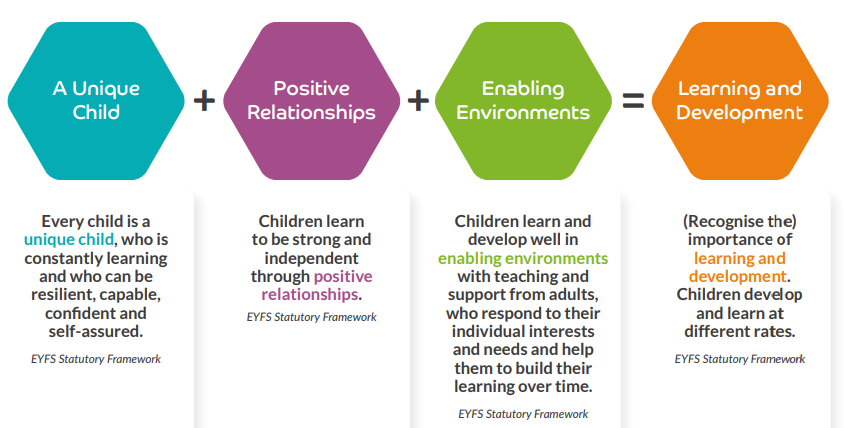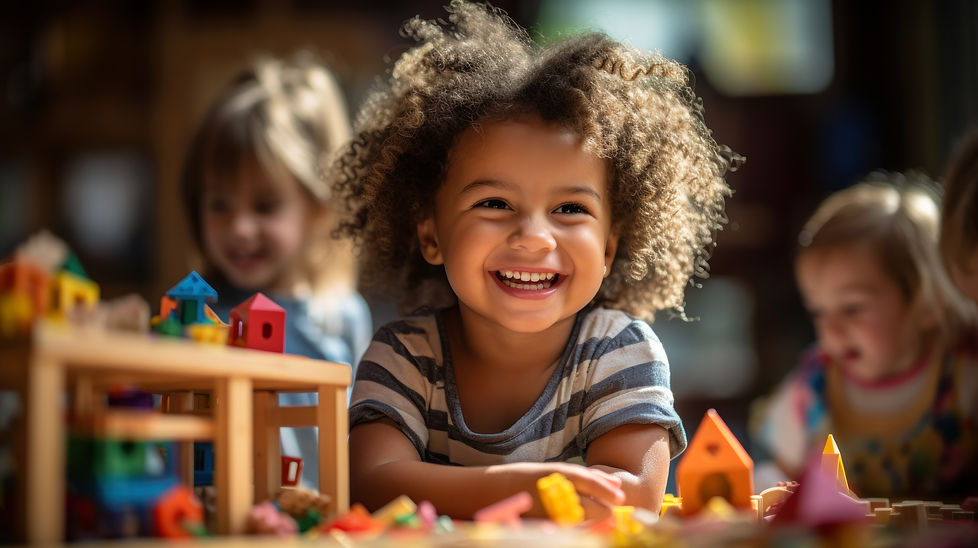
Our Educational Programs
The Early Years Foundation Stage
The Early Years Foundation Stage(EYFS) Framework outlines the standards for learning development and care for every child in England from the age of 0-5 when they attend an early education setting.
Principles of the EYFS

A unique child
Your child is unique, which means that they have their own likes and dislikes and that they will learn and develop in their own way, at their own pace. Birth to 5 Matters encourages settings to make sure that every child is included and can see a representation of themselves and their families: their gender, race, ethnicity, religion, disability, or any other characteristic.
Positive relationships
It is important that your child’s experiences are grounded in positive relationships, as these will help your child to be most able to learn and develop. Your child should have a warm bond with a key person, and you should feel comfortable and secure with the adults who are looking after your child.
What can I expect from my child’s key person?
Birth to 5 Matters will support your child’s key person to understand the importance of the relationship they have with them and help them to get to know your child even better by playing alongside them and noticing what they can do. They understand that your child brings with them lots of experiences from home and the key person will plan learning experiences which support your child to build on what they already know. Your relationship with your child’s key person is really important, as you know your child best. Working together in a trusting relationship will help the key person as they plan for and support your child. You can expect your child will receive respectful intimate care and support to learn everyday life skills.
Enabling environments
Positive experiences in the early years provides a solid foundation for your child as they go through school and on into life. Your setting is committed to providing a learning environment, both inside and outside, which is rich and full of learning possibilities.
Learning and Development
Your child learns best when they are playing and one of the adult’s most important roles is to make sure that your child is able to enjoy learning through play. Your child will also learn through their social interactions with peers.

Being a lifelong learner
The early years is an important time for children, but learning is a lifelong process. The skills, attitudes, and attributes children develop now will be important for them for the rest of their lives. Birth to 5 Matters encourages settings to support children to develop and learn through play, using both indoor and outdoor environments.
Children’s choices are important and Birth to 5 Matters promotes children’s independence to take charge of their own play, because children learn best when they are deeply interested and fully involved. In their early years, children learn about the world through being active, exploring, being creative and learning to think. Being able to play with open-ended resources helps them to develop these characteristics of effective learning.
Research tells us that when children feel safe and secure, they learn best. Having an adult who cares for them and knows when to stand back and when to get involved in their play, is very important.
Children’s learning is often like a winding pathway, so it is important to know that each child’s learning journey is unique to them. The EYFS has separated areas of learning into prime learning areas and specific learning areas.
There are three prime areas of learning which are:
Personal, Social and Emotional Development
Communication and Language
Physical Development
There are four specific areas of learning which are:
Literacy
Mathematics
Understanding the world
Expressive Arts and Design.
However, when a child learns these areas are often interconnected. For example, when a child is playing with water they may be filling and emptying containers. This is a mathematical learning as they learn about capacity. However, if they are playing with another child doing this, they are learning within the Personal, Social and Emotional prime areas of development. Should they be having a conversation about what they are doing, both children are developing speech and language skills. Your child should have play and learning experiences offered to them which cover all these interconnected areas of learning, whether they are a baby or 5 years old.